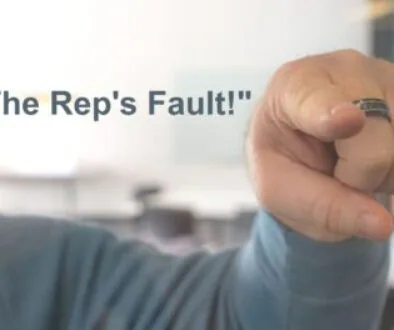Medical Sales Call Frequency: How Often?
One of the most frequently asked questions from medical reps is, “How often should I call on an account or prospect?” To illustrate the importance of having a sales conversation strategy, I’m going to ask you to be the sales prospect for a moment. Let’s say you’re shopping for a common consumer purchase—a car.
You visit a dealership, test-drive a car and sit through an entire sales presentation. You even meet with the business manager, the finance manager, the social media manager, and the customer experience manager—the full-court press, if you will.
There’s lots of sales pressure, but you’re not ready to buy. So you thank the salesperson, and tell them, “I’ll keep it in mind. I need to think about it.” (See that…you say that to get out of sales situations, too, just like your customers!).
You go back to your life. A few days later, you receive a call from the auto salesperson: “Hi, I’m just calling to follow up. Have you made a decision?”
How do you feel when a salesperson asks you a trite question like this?
When it happens to me, I have to suppress my sarcastic reflex. I want to say, “Hey, thanks for following up. You know, I was going to buy that $65,000 car, but… I forgot. Thank god you called!”
But of course, out of respect for a fellow salesperson, I remain polite and say, “I haven’t decided yet. I’ll let you know if I decide to move forward”
Chances are you can relate because this is how most average salespeople sell.
Unfortunately, it’s also extremely common in medical sales.
Medical reps don’t plan their sales conversations. Instead, they get in front of prospects and just blast them with product data—everything they can think of.
Rarely do healthcare products close after just one sales conversation. This means reps often find themselves in a follow-up situation. Only they don’t know what they’re going to talk about when they follow up (since they already covered everything!).
So, they wait a week or two or wait until they run into the prospect again and say something like, “I’m just following up from our last meeting. Have you thought about what we discussed?”
Yeah, they’re probably having a thought right now—about you, and it might not be very kind. You may as well just say, “We talked recently. You ready to buy yet?”
What’s the problem?
The problem is you don’t have a sales conversation strategy!
Sure, there are times when you can close a deal in one call, but your plan should allow for follow-up calls (since you’re in a follow-up situation most of the time).
If the decision to use your product boils down to something other than price, it’s likely that it will take multiple calls to close a sale. Therefore, I strongly recommend this strategy:
Break the sale into multiple conversations, each one having a different focus.
Focus on just one topic in each conversation that is relevant to the prospect’s specialty. Let the prospect take the lead—if they want to discuss something else, they’ll tell you. Read the room! But…
Always have a reason to come back, which is…you guessed it—a different but related relevant issue or topic.
In case you haven’t noticed, I still haven’t answered the original question:
How often should you call on a prospect or account?
Here’s the answer: Whenever you have relevant and valuable information to share.
In other words, whenever you can offer something of potential value to the prospect that wasn’t discussed previously.
Selling this way does several things:
-It de-commoditizes your sales approach because you’re not product-focused like almost every other medical rep that prospect sees.
-You always have “new” reasons to follow up, which, when the prospect benefits, tends to…
-Give you more access to that prospect (because the conversation is about them and not about a product they already have).
Selling in healthcare means you’re going to need to follow up. This requires having a sales conversation strategy. Part of that strategy is to always have something to discuss and a reason to come back. When you have endless topics to discuss, you have endless opportunities to follow-up. No one ever complains about receiving too much value.



